‘Disclaimer’: Louis Partridge on “Horrific” Finale Twist and Real Villain in Alfonso Cuarón’s Thriller
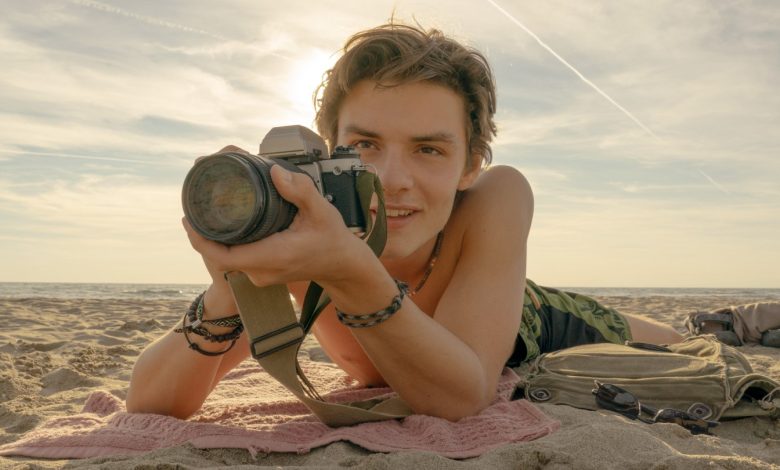
[This story contains major spoilers from the season finale of Disclaimer.]
It’s late into the evening when Louis Partridge finally finds time to talk to The Hollywood Reporter.
The British star is shooting House of Guinness, a new Netflix series from Peaky Blinders mastermind Steven Knight. Partridge explains that he is playing a young Edward Guinness, effortlessly transitioning into a spot-on Dublin accent as he speaks: “It’s a posh, Dublin, RP in 1869, so he talked like that. It’s not like the Dublin that you hear today, which is more like [boxer] Conor McGregor.”
As you read on, you’ll see the young actor has a knack for impressions. His acting chops are landing him bigger and bigger roles. Partridge’s big break came with Netflix’s mystery movie Enola Holmes, starring opposite Millie Bobby Brown as her love interest. At just 21, he’s now worked with the likes of Danny Boyle, Paul King, and is set to star in Noah Baumbach’s untitled Jay Kelly film alongside George Clooney, Greta Gerwig, Laura Dern and Adam Sandler next year. (Oh — and he is the boyfriend of American pop superstar Olivia Rodrigo.)
He can also now add Alfonso Cuarón to his impressive resumé. At the center of the Mexican’s Apple TV+ miniseries Disclaimer is Cate Blanchett, playing acclaimed documentarian Catherine Ravenscroft. She shares a directionless son (Kodi Smit-McPhee) with her wealthy husband Robert (Sacha Baron Cohen), but their lives are turned upside down when a book named The Perfect Stranger is mailed to Catherine and — to her horror — divulges she had, over 20 years prior, an affair with a young 19-year-old, Jonathan Brigstocke (Partridge).
For the first six episodes, the infidelity is recounted through the eyes of Jonathan’s mother, Nancy (Lesley Manville), who blames Blanchett’s character for her son’s drowning — a tragic event that occurred the morning after the pair’s erotic evening together. Her husband, played by Kevin Kline, published the book and basks smugly in the light of the fire he has lit in Catherine’s life. He seeks revenge in honor of his now-deceased wife who never recovered from the loss of her child.
In the season finale, however, Cuarón unveils to his audience a starkly different Jonathan from the shy and bumbling teenager who was supposedly seduced by a provocative young Catherine (Leila George) in flashback scenes.
The other version, in what turns out to be the truth, is far from the Jonathan in Nancy’s mind and writing: he was a rapist, who attacked a mother (George) after her husband was forced to leave her in Italy for a work commitment. The flip-switch from Partridge is chilling, the intensity of betrayal felt by viewers a testament to his (and Cuarón’s) work.
Below, a deeply modest Partridge talks to THR about getting into the mindset of a predator, Cuarón’s unique directorial approach, and finding himself in and among the biggest names in showbiz: “I’m always amazed at how little it seems to mean to me, having worked with such great people. You’d think that would be a marker of real confidence, but it’s amazing and a true testament that confidence must come from within.”
***
Well done on a gripping performance, Louis. I want to ask about the literal and metaphorical nakedness for you in Disclaimer. Was this your first erotic project, and was that daunting?
I dabbled in sex scenes in a show called Pistol that I did and it was tastefully shot, you couldn’t see too much, so I felt somewhat protected. Whereas this was incredibly vulnerable, but also kind of empowering at the same time in a weird way. Once you’ve got your clothes off in front of a room of people and you’ve gone over that hurdle, it weirdly gives you a sense of power. You’ve got nothing to hide, you’re not shying away, you’re here to work. And it was a little funny. I mean, when else would you be in that state? But yes, it was the first time I was vulnerable in that way.
And there was no shying away from it at all — I remember Alfonso saying on the first day of shooting, mid-way through the first scene, “I think we can do it one!” Which means, in typical Alfonso fashion, he wants to try and get the whole 10-minute scene in one take. Hitting every single beat, no hiding with the cuts and edits. It was kind of theatrical. You set up the rules of the game with the person you’re playing and in this case it was Leila who I was opposite, so we talked about it. We felt comfortable with that shot.
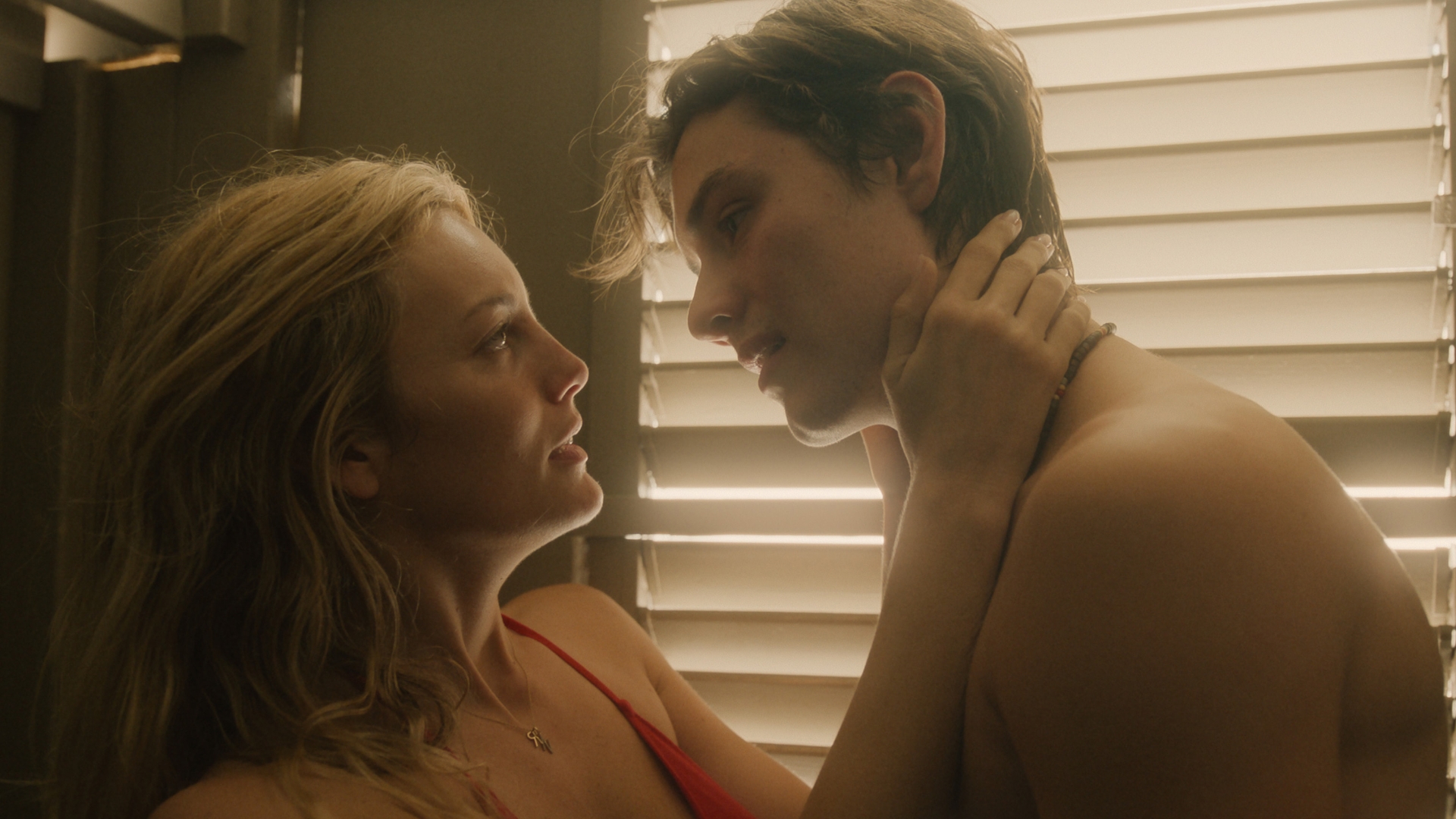
That’s incredible. Does that speak to Alfonso’s directorial style?
Yes, very much. So it was a good thing if he thought you could do it in one take. And he said it about another scene and we did it but it didn’t make the final edit, unfortunately. But yeah, he likes to do that and he’s very big on rhythm, and would rather watch it naturally than recreate it artificially in the edit. So when you’re on set with him, he’d rather just watch you — a lot of directors just disappear into a room and watch on the monitor — but [Alfonso] is there, looking at you and timing it on his phone and saying, [Partridge begins speaking in a Mexican-Spanish accent] “Okay, guys, this was 10 minutes long. Let’s try and get it down to nine minutes and a half or ideally, nine minutes and 15 seconds.” It would be [like] a race, which was great. I enjoyed it.
Have you ever done that impression of Alfonso, to Alfonso?
(Laughs) I haven’t, no. I don’t think I will. He’ll disown me.
For a young actor like you, it must have been unbelievably exciting to have seasoned cast members Cate Blanchett, Sacha Baron Cohen, Kevin Kline and Lesley Manville alongside you. What have you learned from them?
Annoyingly, I didn’t get to have any time with them, which is a shame. It was just me and Leila and there was no crossover. But to be mentioned in the same breath as some of my heroes was kind of weird! It was really good company to be in.
[Spoilers ahead…] We see a very different Jonathan in the finale from what we seen in the first six. What was flipping that switch like? How do you even begin to get into the mindset of an abuser?
I mean, with any part you do your homework, as it were, and then you step onto set and allow yourself to be moved, by Alfonso and outside forces, your other actor and the set. So I did my research, thought about what motivates a person. Because when you play someone, no person thinks, “I’m a bad person.” They act on impulse and they act on behaviors that they’ve come to know is familiar. So I tried to figure out what makes a person do something like that so as not to alienate him from myself.
For the second Jonathan, he’s quite a physical guy. So I had the stunt coordinator, a guy called Greg, who would psych me up and he would hold my fist and I would just push against him in the 15 seconds leading up to the take. Run on the spot, do some press ups to feel like my blood was pumping. There was an animal instinct to what I was feeling and doing, as if Catherine was a rabbit caught in Jonathan’s headlights. Whereas the other Jonathan is, I mean, he couldn’t be further apart. He’s the rabbit in that scenario. That was kind of Alfonso’s idea. He just wanted to make a gap between these two people as large as possible, even though at times it made me feel like, I don’t know, would this early Jonathan be so bumbling and awkward? But he said, “No, it’s important. We’ve got to really stretch this. It’s all about contrast to him,” which was a nice thing. It was helpful for me as an actor to have that and know what I was working against.
That’s so interesting you say that, because I thought the exact same, wondering if a real-life 19-year-old would be so shy. I didn’t pick up on the plot twist at all, but I feel like there were clues — Kylie Minogue posters on his bedroom wall when Nancy was in there, I felt, alluded to her as an unreliable narrator. It matches up with her Jonathan. So there were subtle hints Alfonso left for us. Do you think audiences were supposed to suspect what was revealed to us in episode seven?
I don’t think so. I don’t think he wanted me to leave any clues other than the ones that were there and covered up. There’s various moments, like when my mum, Lesley, gets a call and you can’t make out what’s on the other line and [his girlfriend] Sasha has to go home. So there are these things that [we] gloss over, and then in hindsight, it’s like, oh, the reason she had to go home was because he’d been hitting her. The reason Nancy wouldn’t accept what this lady was saying to her is because she was telling her something about her son that she didn’t want to hear. So you’re right, that version of Jonathan is preserved. The Jonathan in a jar that she wants to protect and preserve as her innocent boy who was derailed by this witch, this Medusa on the beach, as opposed to him being the guy he was. It’s chilling. Nancy is the real monster, really.
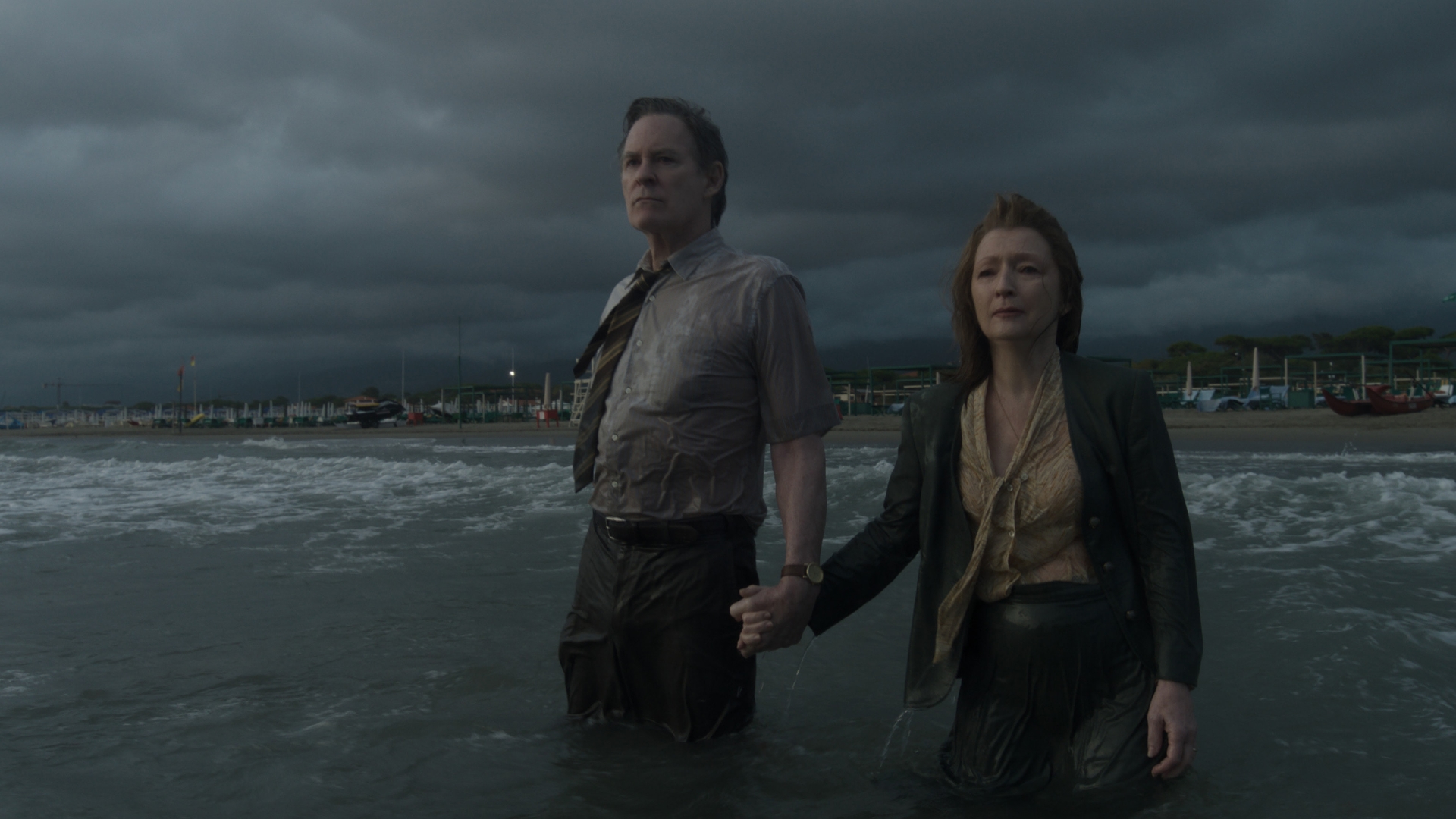
Could you elaborate on that?
Obviously Jonathan is the villain, but I was trying to work out how somebody like this is created and the closest I got was a borderline personality disorder/narcissism. It’s thrown around as a bit selfish, a bit egotistical, but it’s a real condition and it’s something you inherit from a parent. It’s not something you’re born with. Nancy herself is a narcissist, and you see it in her relationship with Stephen, my dad, who runs around after her. When they get the news that Jonathan’s dead, it’s all about her. She’s crying. She’s weeping. And my dad’s running around and putting this blanket on her shoulders. And the reason why he takes this so seriously, Stephen, and he spreads this book is to honor Nancy, because he’s been treated second best all his life, like a weak dad.
I remember having that conversation with Alfonso, that he’s a weak father figure. [He’d say], “And your mum would tell you, ‘This isn’t what you want to be. You want to be a strong man. You want to be capable and your father’s weak.’” It’s a fascinating relationship that we never really got to explore on set but that was the driving force.
It’s so chilling. So this is a show about motherhood, what we’re willing to sacrifice for our children; what we do, say, and how we act that shapes our children. It’s also about the vilification of women and their sexuality. What do you think the message is?
I’d say the main message that leapt out for me is what our beliefs are founded on. I found that, even outside of the show, really, really interesting: how we come to the conclusions we do, what leads us to have the intuitions that we have? And oftentimes, you believe something without having actually thought about it because somebody you respect said it, and then you find yourself saying it again and then without thinking about it. It’s a reinforced belief that you add into your locker.
So I think the nature of intuition and belief is fascinating as it is, but in this case, it causes so much pain, so much suffering and trauma from Nancy’s perspective but also from Robert, Catherine’s husband. I find that relationship — I’m sure you did as well — just so infuriating. Just listen to the poor woman! Once you know what happened, it’s difficult to watch; watching Robert acting on the emotion that he feels having been cheated because he refuses to listen to her. Had he listened, had Robert sat down and said, “Explain your side of the story. I’m going to withhold my immediate emotional reaction, I’m going to let you speak, and I’m going to honor your right to have a moment and to speak,” so much pain could have been avoided. He could have been a good husband, and he wasn’t. He let his own insecurities get in the way. And that was quite startling.
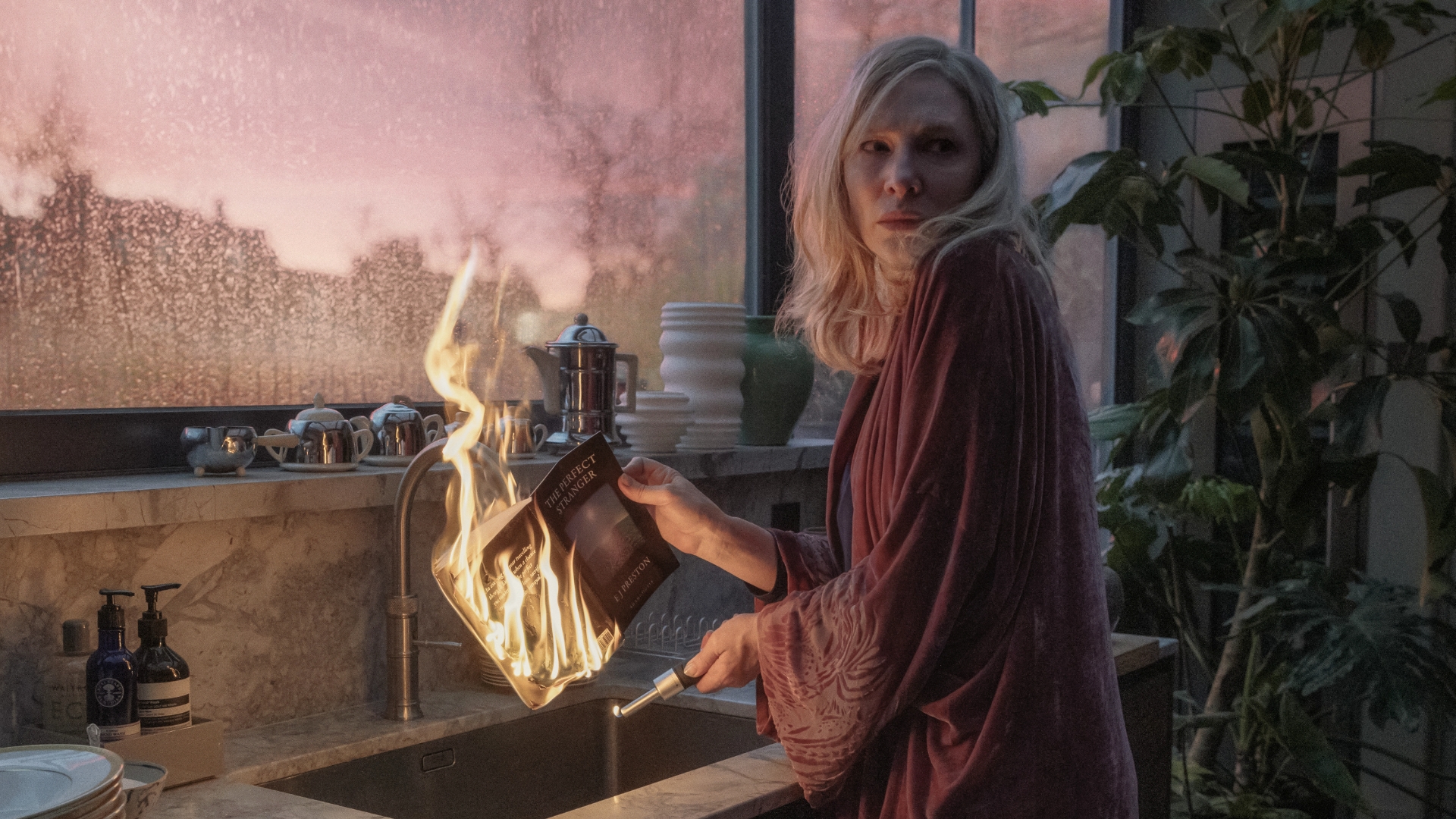
And that balance struck with Leila, this tenderness that turns out to, in reality, be a monstrous sequence of events. She’s playing an entirely different character, too. Was it a very different atmosphere on set?
Oh yeah, totally. It was a very different atmosphere. It went from her taking the reins and being the agent within the scene, to me being the agent. It was interesting to do both, but the dynamic on set was so different. You could have heard a pin drop in between takes during those rape scenes and Leila and I were checking up on each other after each scene. It would be so much as a tap on the shoulder and thumbs up. And then we go back into our separate worlds, because it wouldn’t do to be talking and joking in between those moments. She was so professional and fantastic, she took herself off the table and kept herself in this state for however long the shoot was, for a few days. It was pretty horrific, to be honest. And then going home after that, I was staying with my grandma at the time, having chit chat over at hers. (Laughs)
Oh, my. Is your grandma based in Italy?
She’s not, unfortunately, that’d be cool. The exterior, the beach, was filmed in Italy but the interior of the hotel was done in a studio in Enfield.
If there was ever an antithesis to what you were doing on set, it’s going back to your grandma at the end of the day. I do want to spotlight your career more generally because you are doing amazing stuff right now. Do you feel like you’re on the right path?
Yeah, I’m always amazed at how little it seems to mean to me, having worked with such great people. You’d think that would be a marker of real confidence, but it’s amazing and a true testament that confidence must come from within.
That’s not to say that I’m confident, it’s something you work at and and I do doubt my ability all the time, as I find out pretty much all of us actors do, but it really serves no purpose. I guess if you work hard and you’re interested and want to learn more, then your career will be what it will be. I’m really enjoying it. I love it, and I’m learning more and more. It’s a difficult nut to crack, I find. But not having been to drama school gives me a bit of a challenge. And I feel like there’s certain things I take from each job, and I’m piecing it together in my mind of what it is that works for me, what it is that doesn’t. But I do plan to keep on doing it, and if I can work with people of a similar caliber… that might be hard to continue. I’ve been very lucky in recent years.
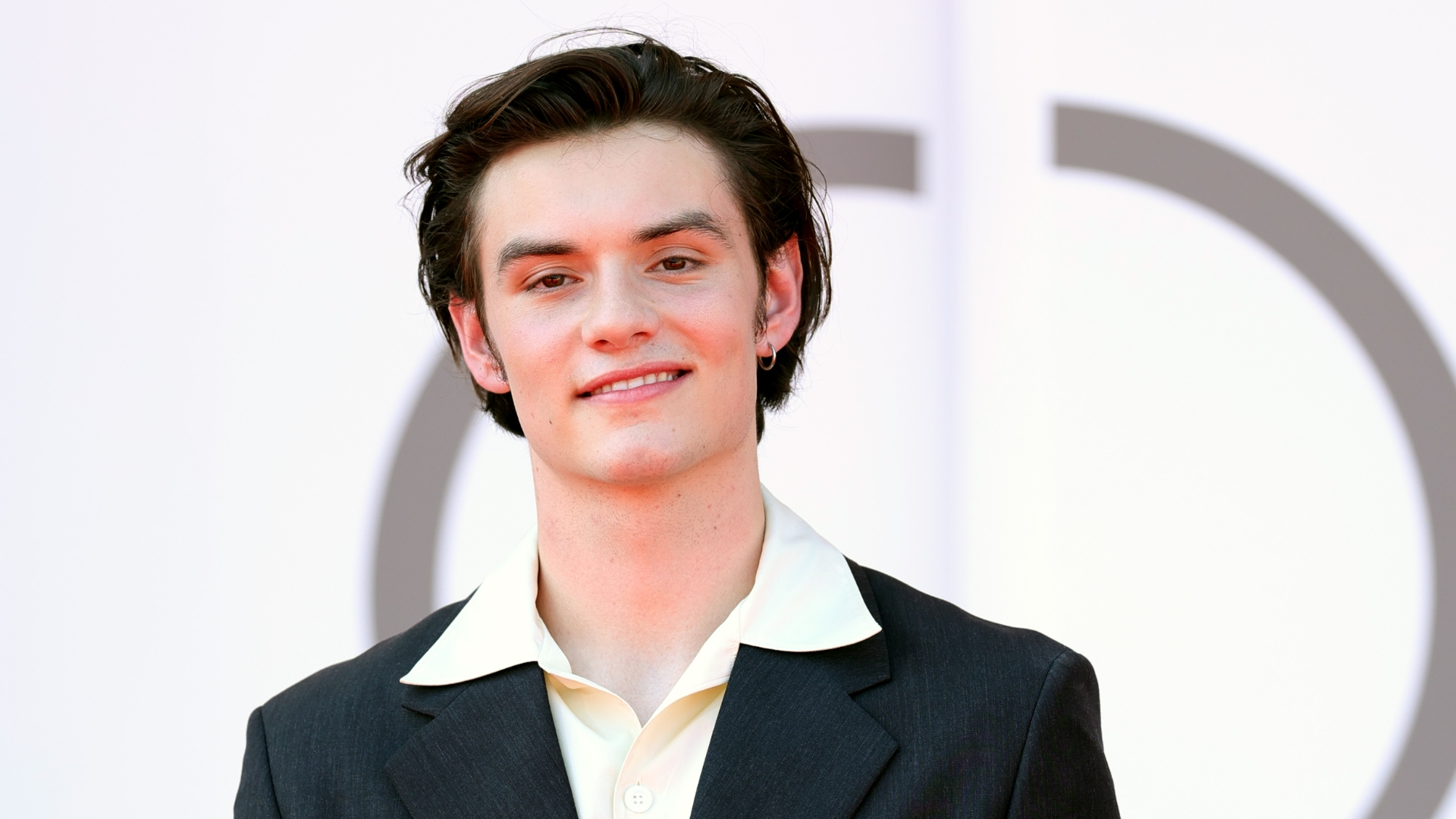
But it’s not just luck. It’s also talent that people, like Alfonso Cuarón, are seeing in you. Who do you want to work with next?
Thank you. Oh, there’s so many directors. The Coen Brothers, Paul Thomas Anderson, Denis Villeneuve, I’d love to work with them. Dream actors? I don’t know, I’d love to do some theater. I think I’d gain a lot from doing theater. I was looking at Hamlet recently. I think that would be the part to play. So I think theater would be a great next move in terms of my education.
I do love film, though. I worked with Noah Baumbach recently, who was on my list of directors that I really wanted to work with. I think I made it when I was about 14, I wrote it down on my notes app. I think there was Gus Van Sant on there, I’d just seen a short film he done. So I was basically just rattling off directors that came to my mind, but I was comforted to be able to tick off Noah.
I’m curious, what’s a bit of advice that you’ve received from someone in the industry that’s so far proved helpful?
Good question! Weirdly, whenever I do seem to ask people or have those conversations, it becomes apparent that they don’t really have a clue.
Everyone else is figuring it out along the way, too.
Exactly. Now I’m remembering it, Mr. George Clooney, which was pretty cool, he said, [Partridge now switches to a deep, Clooney-esque voice] “Hey, when you go for an audition, the worst thing that can happen is you don’t get a job that you never had.” He basically said, “When I started going in there, I didn’t care. I was lucky, not having to pay my rent, I could become free.” And I think there’s something in that carelessness, that indifference, that works.
Another great impression. Can you tell me what you’re working on at the moment?
I’m working on a show called House of Guinness, a Netflix series, directed by two directors, Tom Shankland and Mounia Akl. And it’s written by Steven Knight, who, of course, did Peaky Blinders. He’s a brilliant world builder and he’s created this amazing family. It’s about the Guinness brewery rising and exploding. I play Edward Guinness, who gets gets the brewery handed down once his father dies. I play opposite Anthony Boyle, who’s the other brother and we take the brewery and expand it. There’s many trials and tribulations. And an Irish accent.
How’s that been going?
I love the accent. I know quite a few Irish people, so it seems to come easily [compared to] any other accent I’ve done. Some of the sounds are gorgeous. I think it’s beautiful. Anthony’s Northern Irish so I’ve been trying to identify some of those sounds. I think it’s a brilliant accent. But this is a posh, Dublin, RP [Partridge switches to an extremely convincing and melodic Dublin accent] in 1869 so he talked like that. It’s not like the Dublin that you hear today, which is more like [boxer] Conor McGregor.
That’s really impressive. You’ve seriously got a knack for impressions.
(Laughs) I’ve never been much of an impressionist, but it’s definitely something worth channeling!
***
Disclaimer is now streaming all episodes on Apple TV+.
Source: Hollywoodreporter
Related Posts
- Roundball Rocked: With NBA Return Looming, NBC Purges Scripted Roster
- SoundCloud Says It “Has Never Used Artist Content to Train AI Models” After Backlash on Terms of Service Change
- Fox News’ Camryn Kinsey Is “Doing Well” After Fainting on Live TV
- Kerry Washington and Jahleel Kamera in 'Shadow Force.'
Courtesy of Lionsgate
…
- This Alternative Artist Landed a Top-20 Chart Debut With an Album Made Almost Entirely on His Phone





